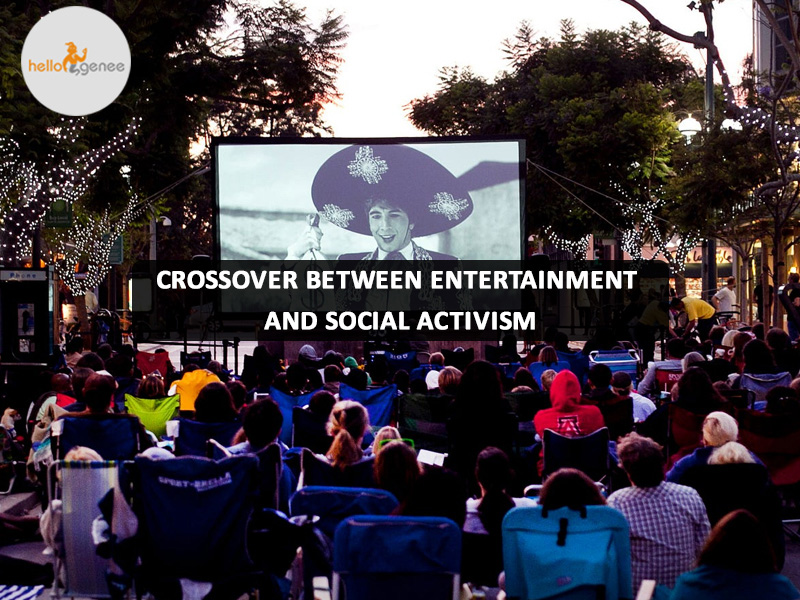Crossover Between Entertainment and Social Activism
The
entertainment scene has changed tremendously of late. No longer satisfied with
being an escape, many filmmakers and celebrities used their platforms to start
relevant conversations and fuel social change. This crossover has birthed an
era of new entertainment consumption: that of conscious media consumption. In
this type of consumption, movies with
a social message are not only appreciated but also highly sought after
by audiences worldwide.
The Rise of Message-Oriented Movies
Long
gone are the days when two very different worlds—entertainment and
activism—existed. Today,good message-based movies are sweeping cinemas and
society in general. They take on issues such as climate change, social
inequality, human rights, and mental health by putting important messages
within compelling storylines that educate through entertainment.
Probably
the most striking of all the benefits that a film with a good message
encompasses lies in its ability to connect with the masses. Traditional forms
of activism had problems engaging people with complex issues when this
happened, while movies did so with ease. Showing a social issue in regard to
personal stories creates emotional connections, which films can use to spur
viewers to make a difference in their own lives.
The Impact of Social Message Films
The
power of cinema is taken much further by movies with social messages. Many such
films shift debates to social media sites and movie message boards, where one
expresses opinions, debates solutions, and even organizes real-time action. The
digital discourse takes the message within the film out to a much larger
audience, thereby causing a ripple effect that might actually manifest in
real-life changes for society.
Moreover,
often it is this genre of movies in a message genre that has become forerunners
to greater social movements. They can put a spotlight on things that are
normally overlooked, challenge social norms, and give a voice to the hitherto
voiceless ones. They, therefore, educate and engage as they entertain, hence
acting as strong tools in social activism.
Celebrity Social Workers: Using Fame
for Good
This
crossover between entertainment and social activism does not get limited to the
silver screen itself. Many celebrities use their celebrity status and influence
to champion various causes important to them in their own individual capacities
as celebrity social workers. In India, while the film industry holds immense
sway over popular culture, some Bollywood stars have taken up the mantle of
social activism.
Influential
celebrities in India are involving their huge fan base to raise awareness about
various social issues. They have been making a difference by urging their fans
to give serious thoughts on the issues of education and gender equality,
spreading environmental and mental health awareness, and proving that 'fame is
a superpower'.
These
celebrities have the mammoth task of drawing a bridge between entertainment and
activism by using their voices to raise awareness around important issues. They
instill in fans the idea that one can be a successful entertainer and an
engaged social advocate at once.
Places for Entertainment: More Than
Just Fun
As
the boundaries between pure entertainment and activism become blurred, so do
those of even traditional places of entertainment. The theme parks incorporate
education on conservation and sustainability. Music festivals turn into a
platform for
social
and political messages; even seemingly light-hearted bars and nightclubs turn
into locations for charity events and awareness campaigns.
The
trend reflects the elevated demands of consumers, who increasingly want
something more than just escapism from their entertainment sources. More and
more people are turning to experiences that are not only fun but also
meaningful and socially conscious.
The Challenge of Balancing
Entertainment and Activism
While
the fusion of entertainment and social activism has surely brought many
positive outputs, it comes with its challenges. Filmmakers who try to make
movies with a social message walk on thin lines between education and
entertainment. If a film is too preachy, it risks alienating audiences.
However, if it's too subtle, there's a risk that the message might get lost.
On
the other hand, it requires intense responsibility to handle platforms
correctly for celebrity social workers. One ought to check on authenticity and
true information in the activism being done; otherwise, they risk being victims
accused of performative wokeness or even just capitalizing on social issues for
personal gain.
The Future of Socially Conscious
Entertainment
Even
amidst all these failures, the marriage of entertainment and social activism is
not going to slow down. With global issues becoming more urgent every day, more
good-messaging movies are going to grace the screens. They are most likely to
come with an increased variety in terms of topics, such as AI's impacts on
society or the myriad challenges brought about by an aging population.
We're
likely to see a lot more innovation in how activism is woven into
entertainment. Virtual and augmented reality technologies, for instance, are
going to create highly immersive experiences when viewers engage with social
issues in ways never witnessed before.
Conclusion
The blending of entertainment and social
activism is a powerful evolution in how we approach art and advocacy with the
same passion. Movies with social messages are successfully showing that
entertainment can be both fun and significant. Celebrity social workers
demonstrate ways in which good can be done when influence is matched with
purpose. And traditional spaces of entertainment have been recreated as
locations of education and social engagement.
Consumers
can force this trend and make it permanent behavior by continuing to seek out
and raise the rafters on message-oriented movies and socially conscious
entertainers. By doing so, we become not just viewers but active participants—a
movement using entertainment to help create a better world.
In
the final analysis, the entertainment-social activism crossover tells us that
art has always been a mirror of society: its triumphs, its struggles, and its
aspirations. For a strong fusion to happen at this time, dealing with this set
of 21st-century problems might just be the spark we need to set truly broad
social change into action.












Comments